In a major regulatory move, the Indian government has issued stern warnings to nine top crypto exchanges, including well-known names like Binance, Kucoin, Huobi, and Kraken. These exchanges face potential access restrictions in India for failing to comply with the country’s Anti Money Laundering (AML) and Counter Financing of Terrorism (CFT) rules.
A Sweeping Compliance Drive
The Financial Intelligence Unit of India (FIU IND) has taken decisive action against these offshore exchanges. Notices have been sent out to these entities, demanding explanations for not registering under India’s strict AML and CFT frameworks. This action aligns with the Prevention of Money Laundering Act (PMLA) of 2002, which India expanded in March 2023 to include Virtual Digital Assets Service Providers (VDA SPs).
These regulations require all crypto exchanges operating in India, regardless of their physical location, to register as Reporting Entities with the FIU IND. This involves meeting a series of obligations that include stringent reporting and record-keeping practices. The move aims to clamp down on potential financial crimes in the crypto space, a sector that has been growing rapidly in India.
Push for Blocking Non-Compliant Platforms
As of now, 31 VDA SPs have successfully registered with the FIU IND. However, the reluctance of these nine major exchanges to comply has led to India’s latest crackdown. The Director of FIU IND has escalated the matter by recommending the blocking of their URLs, effectively cutting off access to these platforms for users in India.
The Indian government’s decisive actions have significant implications for cryptocurrency users in India. By potentially blocking access to these major exchanges, Indian investors might face challenges in accessing a diverse range of digital assets, impacting their trading strategies and portfolio diversity.
Furthermore, this regulatory pressure could lead to a surge in the use of peer-to-peer (P2P) trading platforms, as traders seek alternatives to the mainstream exchanges. This shift could also foster a more localized and fragmented digital asset market within India.
 coinpedia.org
coinpedia.org
